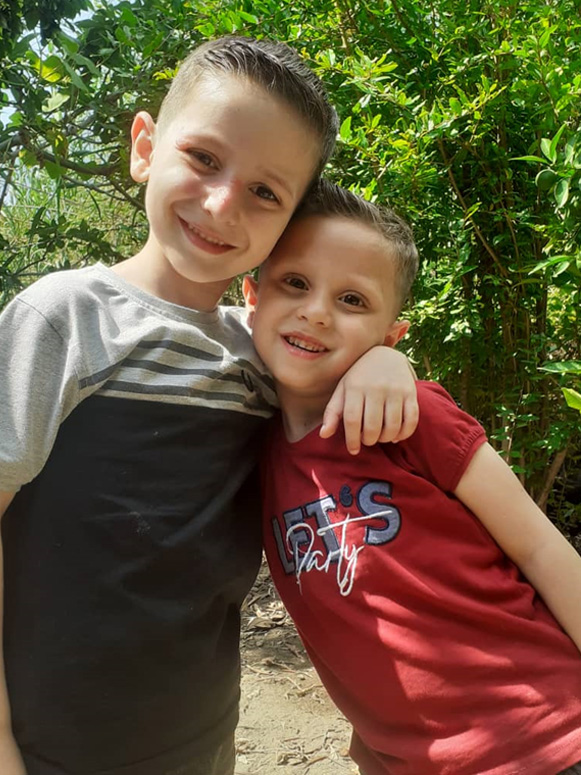 Ebrahim and his brother Yousef can play again, and no one makes fun of their face.2 February 2025 – Ebrahim, a lively 5-year-old boy from the Salah Aldeen neighbourhood in Aleppo governorate, Syria, had always been full of energy and smiles. But when a painful bump appeared on his nose due to a leishmaniasis infection, everything changed. His red, swollen nose began to draw unwanted attention and teasing from other children. Embarrassed and ashamed, Ebrahim avoided playing with his friends and often missed nursery school.
Ebrahim and his brother Yousef can play again, and no one makes fun of their face.2 February 2025 – Ebrahim, a lively 5-year-old boy from the Salah Aldeen neighbourhood in Aleppo governorate, Syria, had always been full of energy and smiles. But when a painful bump appeared on his nose due to a leishmaniasis infection, everything changed. His red, swollen nose began to draw unwanted attention and teasing from other children. Embarrassed and ashamed, Ebrahim avoided playing with his friends and often missed nursery school.
Ebrahim’s father, Mohammad, a photographer, initially didn’t realize the severity of the issue. “I work late nights and sleep during the day, so I didn’t understand how much this was affecting Ebrahim until my wife told me that he had stopped going out to play because he was ashamed of his nose,” Mohammad admitted.
Determined to help his son, Mohammad took Ebrahim to the Salah Aldeen health centre, which housed a leishmaniasis treatment clinic supported by the World Health Organization (WHO). There, Ebrahim began a 4-month free treatment programme in March 2024. As the bump on his nose faded, his confidence returned. Soon, he was smiling again, back in kindergarten and playing with his friends.
When Ebrahim’s younger brother, Yousef, also contracted leishmaniasis, Mohammad and his wife acted immediately. “This time, we knew what to do. We took Yousef to the same clinic right away, and within 2 months he had completed his treatment,” Mohammad shared. “We learned how important it is to act quickly and not ignore health issues.”
Each year, Syria typically records 68 000 cases of cutaneous leishmaniasis, the most common form of the disease. It is caused by a protozoan parasite transmitted through bites from infected sandflies. Without treatment, the disease can cause severe skin lesions that can scar and lead to social stigma.
Since 2015, WHO has partnered with national health authorities in Syria to provide free treatment, annually supplying 200 000 ampoules of the medicine meglumine antimoniate, and protecting families through targeted interventions to control the spread of leishmaniasis. These include indoor residual spraying of 73 000 households in Aleppo, Hama and Idlib governorates.
Today, Ebrahim is thriving. “I can play again, and no one makes fun of my face anymore,” he said proudly.
Reflecting on the experience, Mohammad shared, “This taught me how essential good health care is, especially for our children. I hope more families can access the support they need.”
World Neglected Tropical Diseases Day is celebrated every year on 30 January. This year, the theme of the Day is “Unite. Act. Eliminate." Leishmaniasis is one of many neglected tropical diseases that continue to affect vulnerable populations in Africa, the Middle East, Asia, Central and South America and southern Europe. Efforts like those at the Salah Aldeen leishmaniasis treatment centre are testament to the importance of uniting communities and acting decisively to eliminate the burden of these diseases.
Ebrahim’s story showcases the resilience of families and underscores the lifesaving impact of accessible health care, even in the most challenging circumstances.


